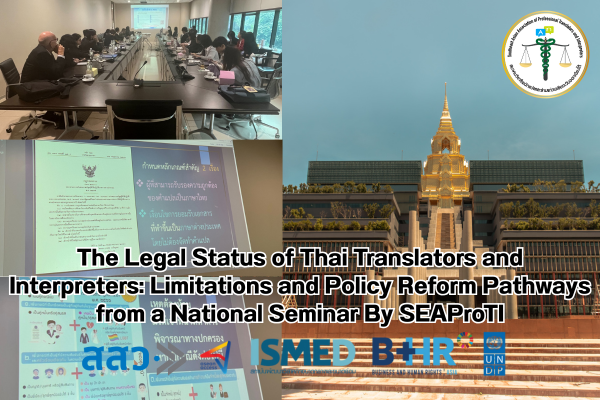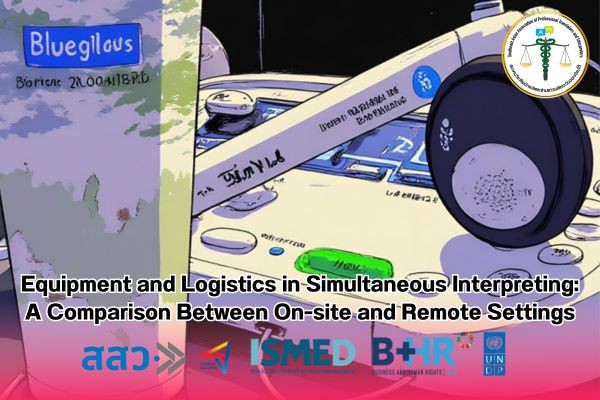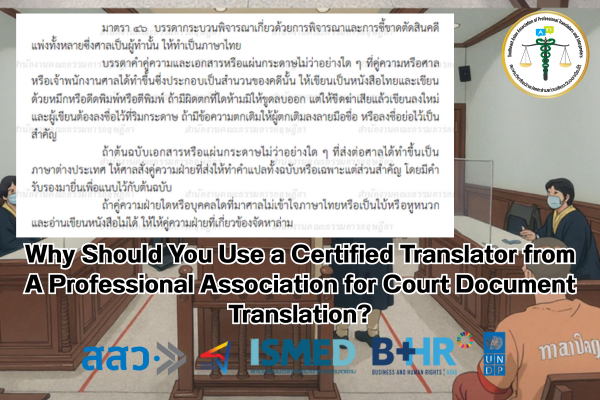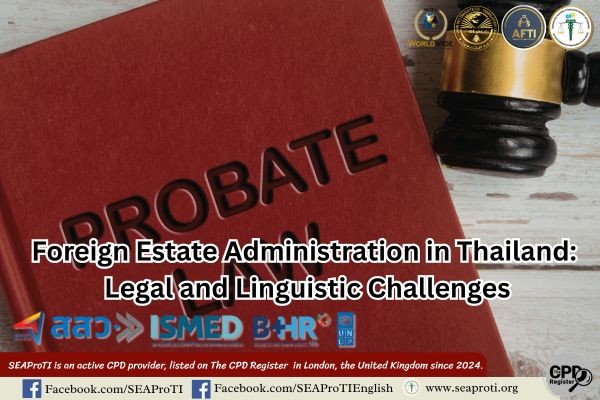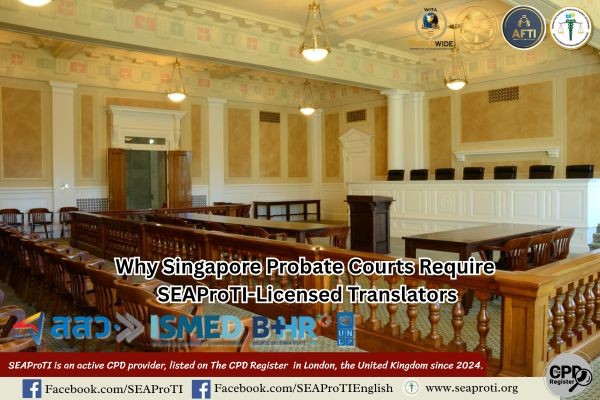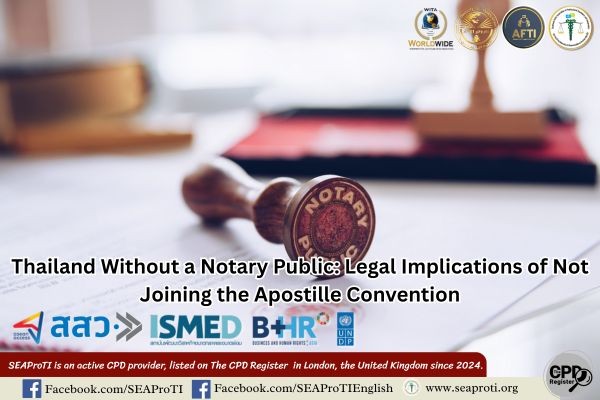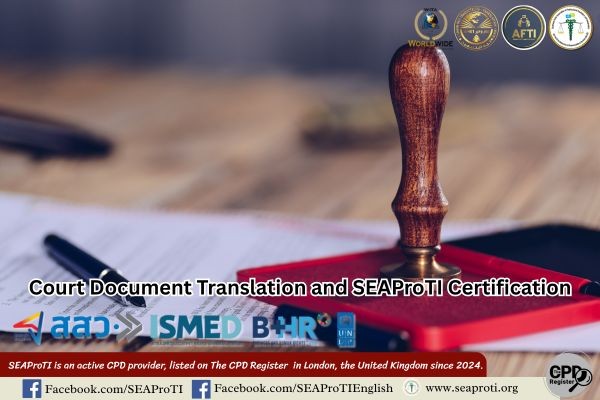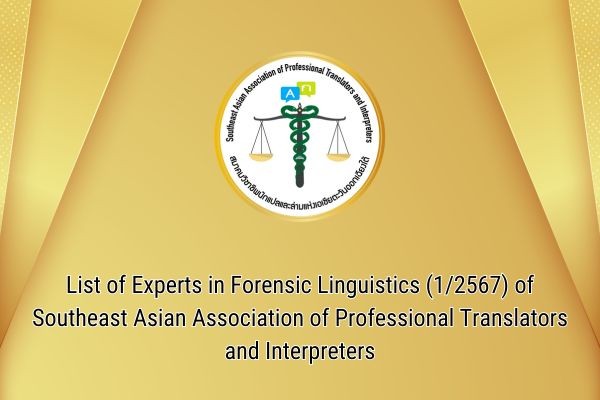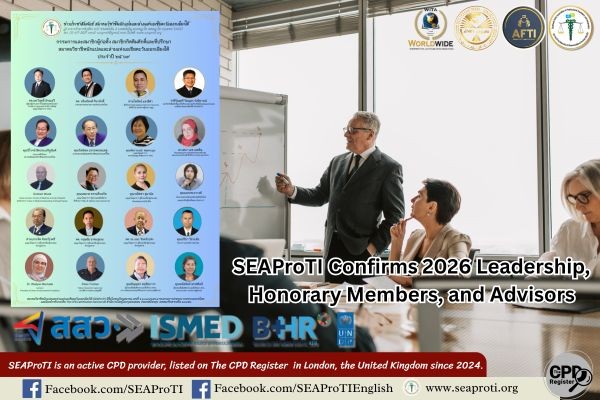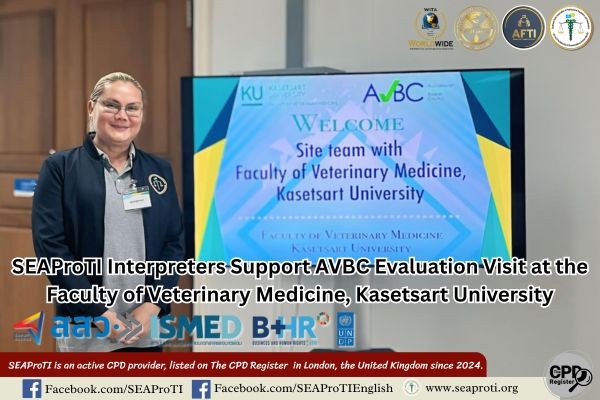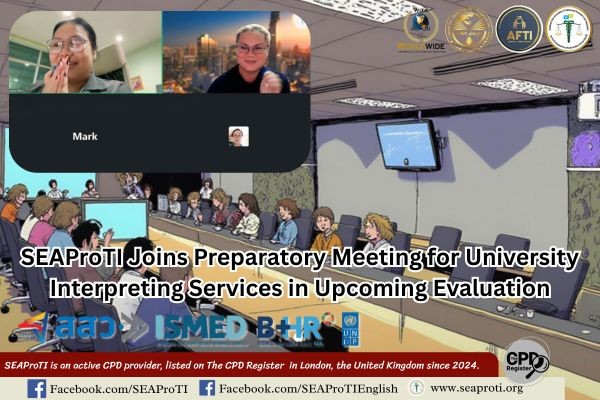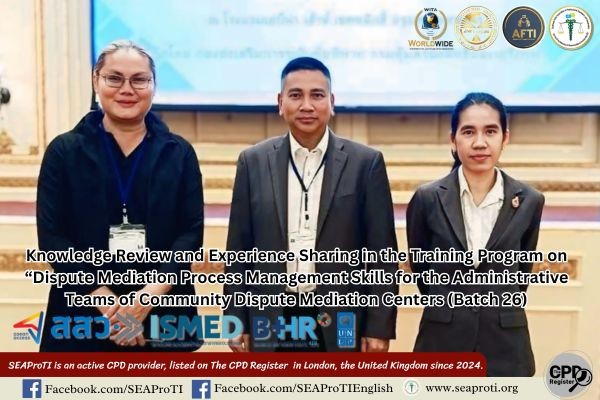The Legal Status of Thai Translators and Interpreters: Limitations and Policy Reform Pathways from a National Seminar By the Southeast Asian Association of Professional Translators and Interpreters (SEAProTI)
This article presents a summary of key insights from the national seminar titled “The Legal Standing and Professional Limitations of Translators and Interpreters under Current Thai Law”, held on 16 June 2025 at the new Parliament Complex in Bangkok. The event aimed to foster understanding of the professional and legal roles of translators and interpreters in Thailand, as well as identify legal constraints that hinder professional development. The discussion also proposed concrete policy reform strategies, based on exchanges among government representatives, academics, and practitioners.
1. Background and Rationale
Translators and interpreters play a vital role in cross-linguistic communication in both the public and private sectors in Thailand. However, the legal status of this profession remains ambiguous. This lack of clarity has led to misinterpretation of translated documents, complications in product registration, and inconsistent hiring practices. The seminar was convened to examine current legal provisions and explore avenues to improve legislation that supports and formalizes the profession.
2. Key Issues from the Seminar
2.1 Outdated Ministerial Regulation (1997)
Although the law allows certain individuals or agencies to certify translations, the relevant ministerial regulation has not been updated in over 30 years. This has resulted in many qualified professionals being excluded from lawful practice.
2.2 Proposal for an “Item 5 Clause”
The Office of the Council of State expressed preliminary support for a new provision that would allow professional associations and language institutes to offer certified training programs and issue formal credentials. This could expand the pool of legally recognized translation professionals.
2.3 Problem of Illegal Translation Certifications
Numerous translation agencies and companies continue to provide services that violate legal requirements, especially in translating official or medical documents without proper authorization or legal knowledge.
2.4 Understanding Bureaucratic Structures and State Duties
Participants emphasized the need for translators and interpreters to understand the structure and workflow of government agencies in order to produce legally valid translations. Additionally, public officials are legally obligated to provide accurate information to the public.
3. Clarification from SEAProTI
3.1 SEAProTI Does Not Seek to Amend Court Interpreter Laws
SEAProTI issued a formal clarification that it has no intention to advocate changes to legislation governing judicial interpreters. The provision of court interpretation falls under the state’s responsibility, especially under international treaties such as the International Covenant on Civil and Political Rights (UN, 1966), which mandates that interpreters be provided to criminal defendants at no cost.
3.2 SEAProTI’s Focus and Goals
The association’s mission is to strengthen and professionalize translation and interpreting in the private sector and executive branches of government. SEAProTI is committed to improving standards and ensuring fair compensation for professionals.
4. The Role of the Office of the Council of State in the Legislative Process
There is a common misconception that the Office of the Council of State has the authority to legislate. In reality, its role is limited to reviewing and providing legal opinions on draft laws proposed by authorized entities, such as the Cabinet or the Prime Minister’s Office. This is particularly relevant to discussions surrounding the Administrative Procedure Act B.E. 2539 (1996) and related ministerial regulations on certified translation.
5. Conclusion and Recommendations
This seminar marked a significant milestone in SEAProTI’s policy advocacy efforts to establish formal legal recognition for translators and interpreters in Thailand. The outcomes of the discussion will be compiled into a policy paper to be submitted to the Prime Minister’s Office and legislative bodies for consideration.
References
- Office of the Council of State. (2024). Roles and Functions of the Office of the Council of State in the Legislative Process. Bangkok: Office of the Prime Minister.
- United Nations. (1966). International Covenant on Civil and Political Rights (ICCPR). Retrieved from https://www.ohchr.org/en/instruments-mechanisms/instruments/international-covenant-civil-and-political-rights
- SEAProTI. (2025). Report on the National Seminar: “The Legal Standing and Professional Limitations of Translators and Interpreters under Current Thai Law”. Bangkok: Southeast Asian Association of Professional Translators and Interpreters.
SEAProTI’s certified translators, translation certification providers, and certified interpreters:
The Southeast Asian Association of Professional Translators and Interpreters (SEAProTI) has officially announced the criteria and qualifications for individuals to register as “Certified Translators,” “Translation Certification Providers,” and “Certified Interpreters” under the association’s regulations. These guidelines are detailed in Sections 9 and 10 of the Royal Thai Government Gazette, issued by the Secretariat of the Cabinet under the Office of the Prime Minister of the Kingdom of Thailand, dated July 25, 2024, Volume 141, Part 66 Ng, Page 100.
To read the full publication, visit the Royal Thai Government Gazette
สถานะทางกฎหมายของนักแปลและล่ามไทย: ข้อจำกัด และแนวทางการปฏิรูปจากเวทีเสวนาระดับชาติ
โดย สมาคมวิชาชีพนักแปลและล่ามแห่งเอเชียตะวันออกเฉียงใต้ (SEAProTI)
บทความนี้สรุปสาระสำคัญจากการเสวนาวิชาการระดับชาติในหัวข้อ “สถานะทางกฎหมายของนักแปลและล่ามไทย และข้อจำกัดภายใต้กฎหมายปัจจุบัน” ซึ่งจัดขึ้นเมื่อวันที่ 16 มิถุนายน พ.ศ. 2568 ณ อาคารรัฐสภาแห่งใหม่ กรุงเทพมหานคร โดยมีเป้าหมายเพื่อสร้างความเข้าใจเกี่ยวกับบทบาทของนักแปลและล่ามในประเทศไทย ตลอดจนข้อจำกัดทางกฎหมายที่เป็นอุปสรรคต่อการพัฒนาอาชีพ ทั้งนี้มีการเสนอแนวทางการปรับปรุงเชิงนโยบาย อิงจากการอภิปรายร่วมกันระหว่างผู้แทนจากภาครัฐ นักวิชาการ และผู้ปฏิบัติงานจริง
ที่มาของการจัดงาน
นักแปลและล่ามในประเทศไทยมีบทบาทสำคัญในกระบวนการสื่อสารข้ามภาษาในภาครัฐและเอกชน อย่างไรก็ดี สถานะทางกฎหมายของวิชาชีพนี้ยังไม่ชัดเจน ส่งผลให้เกิดความคลาดเคลื่อนในการรับรองงานแปล การขึ้นทะเบียนผลิตภัณฑ์ และการว่าจ้างในบริบทต่าง ๆ การเสวนาวิชาการครั้งนี้จึงจัดขึ้นเพื่อทบทวนข้อกฎหมายปัจจุบัน และเสนอแนวทางพัฒนากฎหมายที่รองรับวิชาชีพอย่างมีประสิทธิภาพ
ประเด็นสำคัญจากการเสวนา
กฎกระทรวง พ.ศ. 2540 ที่ล้าสมัย
แม้กฎหมายอนุญาตให้หน่วยงานบางกลุ่มสามารถรับรองการแปลได้ แต่ไม่มีการปรับปรุงนโยบายมานานกว่า 30 ปี ส่งผลให้ผู้เชี่ยวชาญบางรายไม่มีสถานะทางกฎหมายในการปฏิบัติงาน
ข้อเสนอ “วงเล็บ 5”
สำนักคณะกรรมการกฤษฎีกาให้ความเห็นเบื้องต้นว่าสามารถเสนอให้สมาคมวิชาชีพและสถาบันภาษาจัดหลักสูตรและออกใบรับรองอย่างเป็นทางการได้ ซึ่งจะช่วยขยายกลุ่มผู้เชี่ยวชาญที่สามารถรับรองเอกสารได้อย่างถูกต้องตามกฎหมาย
ปัญหาการรับรองการแปลที่ผิดกฎหมาย
ร้านแปลและบริษัทแปลจำนวนหนึ่งให้บริการโดยละเมิดหลักเกณฑ์ทางกฎหมาย โดยเฉพาะการแปลเอกสารราชการหรือการแพทย์โดยไม่มีใบอนุญาตหรือความเข้าใจทางกฎหมายที่เพียงพอ
โครงสร้างราชการและหน้าที่ของรัฐ
ผู้เข้าร่วมเสวนาย้ำว่านักแปลและล่ามต้องเข้าใจโครงสร้างของภาครัฐเพื่อแปลเอกสารได้อย่างถูกต้องตามกระบวนการ และเจ้าหน้าที่รัฐมีหน้าที่ตามกฎหมายในการให้ข้อมูลที่ถูกต้องแก่ประชาชน
ข้อชี้แจงจาก SEAProTI
SEAProTI ไม่เสนอแก้กฎหมายล่ามศาล
มีการชี้แจงอย่างเป็นทางการว่า สมาคมไม่มีแนวคิดเข้าไปแก้ไขกฎหมายเกี่ยวกับล่ามในกระบวนการยุติธรรม เนื่องจากการจัดหาล่ามในศาลเป็นภารกิจของรัฐ ตามพันธกรณีระหว่างประเทศ เช่น อนุสัญญาสหประชาชาติว่าด้วยสิทธิของผู้ต้องหา (UN, 1966)
เป้าหมายของสมาคม
SEAProTI เน้นการพัฒนาและส่งเสริมอาชีพนักแปลและล่ามในภาคเอกชนและภาครัฐฝ่ายบริหารโดยมุ่งยกระดับมาตรฐานวิชาชีพ และรักษาค่าตอบแทนที่เหมาะสมแก่ผู้ประกอบวิชาชีพ
บทบาทของสำนักกฤษฎีกาในกระบวนการออกกฎหมาย
การตีความบทบาทของสำนักคณะกรรมการกฤษฎีกามักมีความเข้าใจผิดว่าเป็นผู้ออกกฎหมายโดยตรง แท้จริงแล้ว สำนักฯ มีหน้าที่ในการตรวจสอบและให้ความเห็นต่อร่างกฎหมายที่เสนอมาจากหน่วยงานอื่น โดยเฉพาะในกรณีของพระราชบัญญัติวิธีปฏิบัติราชการทางปกครอง พ.ศ. 2539 (สำนักงานคณะกรรมการกฤษฎีกา, 2567)
บทสรุปและข้อเสนอแนะ
การเสวนานี้เป็นหมุดหมายสำคัญของ SEAProTI ในการขับเคลื่อนการยกระดับสถานะของนักแปลและล่ามในประเทศไทยให้เป็นที่ยอมรับตามกฎหมาย การจัดทำเอกสารวิชาการจากเวทีเสวนานี้จะนำเสนอแก่สำนักนายกรัฐมนตรีและหน่วยงานนิติบัญญัติเพื่อเป็นข้อมูลเชิงนโยบายต่อไป
การอ้างอิง (References)
- สำนักงานคณะกรรมการกฤษฎีกา. (2567). บทบาทและหน้าที่ของสำนักงานคณะกรรมการกฤษฎีกาในกระบวนการออกกฎหมาย. กรุงเทพฯ: สำนักนายกรัฐมนตรี.
- United Nations. (1966). International Covenant on Civil and Political Rights (ICCPR). Retrieved from https://www.ohchr.org/en/instruments-mechanisms/instruments/international-covenant-civil-and-political-rights
- SEAProTI. (2568). รายงานผลการเสวนา “สถานะทางกฎหมายของนักแปลและล่ามไทย และข้อจำกัดภายใต้กฎหมายปัจจุบัน”. กรุงเทพฯ: สมาคมวิชาชีพนักแปลและล่ามแห่งเอเชียตะวันออกเฉียงใต้.
เกี่ยวกับนักแปลรับรอง ผู้รับรองการแปล และล่ามรับรองของสมาคมวิชาชีพนักแปลและล่ามแห่งเอเชียตะวันออกเฉียงใต้
สมาคมวิชาชีพนักแปลและล่ามแห่งเอเชียตะวันออกเฉียงใต้ (SEAProTI) ได้ประกาศหลักเกณฑ์และคุณสมบัติผู้ที่ขึ้นทะเบียนเป็น “นักแปลรับรอง (Certified Translators) และผู้รับรองการแปล (Translation Certification Providers) และล่ามรับรอง (Certified Interpreters)” ของสมาคม หมวดที่ 9 และหมวดที่ 10 ในราชกิจจานุเบกษา ของสำนักเลขาธิการคณะรัฐมนตรี ในสำนักนายกรัฐมนตรี แห่งราชอาณาจักรไทย ลงวันที่ 25 ก.ค. 2567 เล่มที่ 141 ตอนที่ 66 ง หน้า 100 อ่านฉบับเต็มได้ที่: นักแปลรับรอง ผู้รับรองการแปล และล่ามรับรอง


